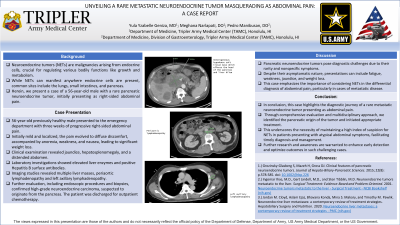Sunday Poster Session
Category: Biliary/Pancreas
P0192 - Unveiling a Rare Metastatic Neuroendocrine Tumor Masquerading as Abdominal Pain: A Case Report
Sunday, October 27, 2024
3:30 PM - 7:00 PM ET
Location: Exhibit Hall E

Has Audio
- YG
Yula Geniza, MD
Tripler Army Medical Center
Honolulu, HI
Presenting Author(s)
Yula Geniza, MD
Tripler Army Medical Center, Honolulu, HI
Introduction: Neuroendocrine tumors (NETs) are malignancies arising from endocrine cells, crucial for regulating various bodily functions like growth and metabolism. While NETs can manifest anywhere endocrine cells are present, common sites include the lungs, small intestines, and pancreas. Herein, we present a case of a 56-year-old male with a rare pancreatic neuroendocrine tumor, initially presenting as right-sided abdominal pain.
Case Description/Methods: A 56-year-old previously healthy male presented to the emergency department with three weeks of progressive right-sided abdominal pain. Initially mild and localized, the pain evolved to diffuse discomfort accompanied by anorexia, weakness, and nausea leading to significant weight loss. Clinical examination revealed jaundice, hepatosplenomegaly, and a distended abdomen. Laboratory investigations revealed elevated liver enzymes and positive Hepatitis B surface antibodies. Imaging studies revealed multiple liver masses suggestive of metastatic disease. Further evaluation, including endoscopic procedures and biopsies, confirmed high-grade neuroendocrine carcinoma suspected to originate from the pancreas. The patient was discharged for outpatient chemotherapy.
Discussion: Pancreatic neuroendocrine tumors pose diagnostic challenges due to their rarity and nonspecific symptoms. Despite their asymptomatic nature, presentations can include fatigue, weakness, jaundice, and weight loss. This case emphasizes the importance of considering NETs in the differential diagnosis of abdominal pain, particularly in cases of metastatic disease.
In conclusion, this case highlights the diagnostic journey of a rare metastatic neuroendocrine tumor presenting as abdominal pain. Through comprehensive evaluation and multidisciplinary approach, we identified the pancreatic origin of the tumor and initiated appropriate treatment. This underscores the necessity of maintaining a high index of suspicion for NETs in patients presenting with atypical abdominal symptoms, facilitating timely diagnosis and management. Further research and awareness are warranted to enhance early detection and optimize outcomes in such challenging cases.
Disclosures:
Yula Geniza, MD. P0192 - Unveiling a Rare Metastatic Neuroendocrine Tumor Masquerading as Abdominal Pain: A Case Report, ACG 2024 Annual Scientific Meeting Abstracts. Philadelphia, PA: American College of Gastroenterology.
Tripler Army Medical Center, Honolulu, HI
Introduction: Neuroendocrine tumors (NETs) are malignancies arising from endocrine cells, crucial for regulating various bodily functions like growth and metabolism. While NETs can manifest anywhere endocrine cells are present, common sites include the lungs, small intestines, and pancreas. Herein, we present a case of a 56-year-old male with a rare pancreatic neuroendocrine tumor, initially presenting as right-sided abdominal pain.
Case Description/Methods: A 56-year-old previously healthy male presented to the emergency department with three weeks of progressive right-sided abdominal pain. Initially mild and localized, the pain evolved to diffuse discomfort accompanied by anorexia, weakness, and nausea leading to significant weight loss. Clinical examination revealed jaundice, hepatosplenomegaly, and a distended abdomen. Laboratory investigations revealed elevated liver enzymes and positive Hepatitis B surface antibodies. Imaging studies revealed multiple liver masses suggestive of metastatic disease. Further evaluation, including endoscopic procedures and biopsies, confirmed high-grade neuroendocrine carcinoma suspected to originate from the pancreas. The patient was discharged for outpatient chemotherapy.
Discussion: Pancreatic neuroendocrine tumors pose diagnostic challenges due to their rarity and nonspecific symptoms. Despite their asymptomatic nature, presentations can include fatigue, weakness, jaundice, and weight loss. This case emphasizes the importance of considering NETs in the differential diagnosis of abdominal pain, particularly in cases of metastatic disease.
In conclusion, this case highlights the diagnostic journey of a rare metastatic neuroendocrine tumor presenting as abdominal pain. Through comprehensive evaluation and multidisciplinary approach, we identified the pancreatic origin of the tumor and initiated appropriate treatment. This underscores the necessity of maintaining a high index of suspicion for NETs in patients presenting with atypical abdominal symptoms, facilitating timely diagnosis and management. Further research and awareness are warranted to enhance early detection and optimize outcomes in such challenging cases.
Disclosures:
Yula Geniza indicated no relevant financial relationships.
Yula Geniza, MD. P0192 - Unveiling a Rare Metastatic Neuroendocrine Tumor Masquerading as Abdominal Pain: A Case Report, ACG 2024 Annual Scientific Meeting Abstracts. Philadelphia, PA: American College of Gastroenterology.
